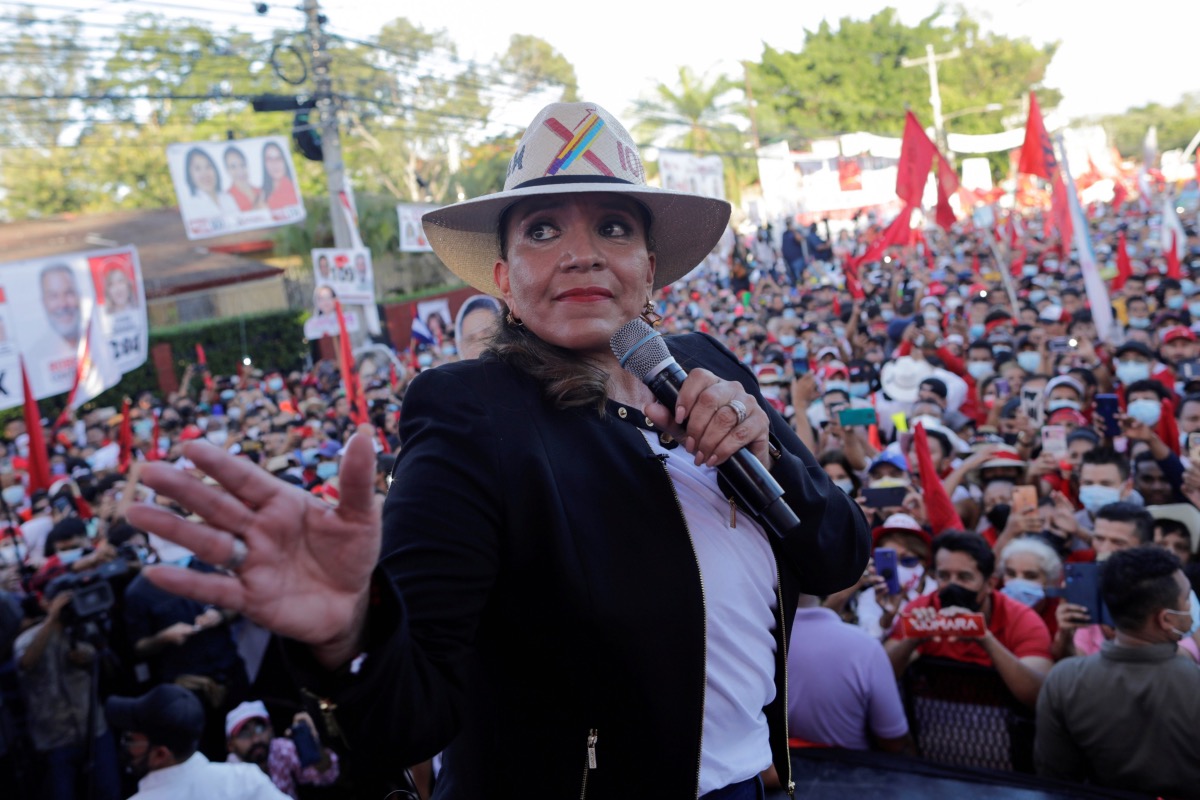

Honduran President Xiomara Castro (Radar2020/Twitter)
Nicaragua, in Brief: Central American leaders are averting their gaze from Nicaragua’s Ortega-Murillo regime, aware that picking a fight with the most consolidated autocracy in Central America would give more oxygen to criticism of corruption and human rights violations in their own countries. But the complicity is also about money: When in dire straits, there’s enough cash to go around at Central America’s development bank.
Common Cause
On Tuesday, in Tegucigalpa, President Xiomara Castro, who bills herself as a small-D democrat who liberated her country from “12 years of narco-dictatorship,” awarded Nicaraguan despot Daniel Ortega a plaque for his “support for democracy and the resistance of the Honduran people against the 2009 coup.”
You read that right: “support for democracy.” It’s a curious way to describe a Sandinista government that is currently holding over 180 political prisoners, that took the elections last year by canceling two opposition parties and arresting seven candidates, and whose Congress, just this week, annulled the legal standing of 200 civil society organizations.
That makes for 800 organizations canceled by the Sandinista legislature this year, touching university student and faculty associations, anti-poverty and charity groups, and even Indigenous collectives. This week a group of Catholic nuns running a shelter for needy kids and a nursing home for the elderly was expelled from the country.
But perhaps even more indicative of the political winds in Central America than Castro’s homage to Ortega was a vote by the OAS to condemn the Nicaraguan government’s expropriation of its local facilities in April. Honduras abstained, as did El Salvador.
President Nayib Bukele, who called Ortega an “illegitimate” dictator prior to taking office in 2019, has now joined him in denouncing the OAS as an imperial shill. Bukele’s ambassador to the OAS justified the abstention by claiming that the international body is working “in favor of some and against others, distorting and eroding peaceful coexistence.”
Central American leaders are finding common cause in playing the national sovereignty card to rebuff international criticism of corruption, human rights abuses, and authoritarianism. At the Americas Summit in early June, the foreign ministers of Guatemala, El Salvador, and Honduras all stressed it in their remarks. Nicaragua wasn’t invited.
Home Field
But Ortega doesn’t need to play on Joe Biden’s turf. The country is preparing to take the helm of the Central American Integration System (SICA), a key forum for setting regional political agendas related to health, education, culture, environmental issues, monetary policy, trade, and commerce. It’s Nicaragua’s turn to choose the SICA secretary-general for the 2021-2025 term, a move requiring the political support of the rest of the region.
Last year, SICA unanimously rejected Ortega’s shortlist of candidates, saying they “lack knowledge” and were “too close to the regime.” But they seem to have made peace. According to the Costa Rican foreign minister, Ortega’s shortlist now has the support of all Central American governments—even that of Guatemala, which derides critics as “chairos,” a pejorative for communists.
Complicity with the regime isn’t only political; it’s also financial. Ortega has found cash not in Moscow —he is, after all, a close ally of Putin amid the invasion of Ukraine— but in Tegucigalpa, home to the Central American Bank for Economic Integration (CABEI).
On Tuesday the Assembly approved a CABEI loan worth $350 million for highway maintenance. The development bank, founded by five Central American states in 1960, has invested $1.6 billion in ongoing projects on health, poverty, and climate change.
CABEI has become a lifeline for governments on frosty terms with the United States. The bank told El Faro’s Jimmy Alvarado that it is now in the final stages of issuing a $220 million loan to the Bukele administration—money that, combined with another $100 million from the World Bank, will help the administration avoid default this year.
From May to December of 2021, as Bukele’s negotiations with the IMF for a debt restructuring fell apart amid disagreements on democratic backsliding and the Bitcoin Law, the Central American bank lent the country a hefty $1.6 billion.
It’s worth underscoring that Nicaragua’s octogenarian dictator, who’s not on Twitter, and El Salvador’s TikTok strongman have found a common bunker of refuge.
Thanks for reading. Just one final note before you go. We need your help: Please share this newsletter with a friend to help our community grow, and consider funding uncensored Central American journalism at support.elfaro.net.


